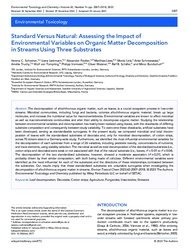Standard Versus Natural: Assessing the Impact of Environmental Variables on Organic Matter Decomposition in Streams Using Three Substrates
Persistent URL: http://resolver.sub.uni-goettingen.de/purl?gldocs-11858/11130
 |
Dokument öffnen: |
The decomposition of allochthonous organic matter, such as leaves, is a crucial ecosystem process in low‐order streams. Microbial communities, including fungi and bacteria, colonize allochthonous organic material, break up large molecules, and increase the nutritional value for macroinvertebrates. Environmental variables are known to affect microbial as well as macroinvertebrate communities and alter their ability to decompose organic matter. Studying the relationship between environmental variables and decomposition has mainly been realized using leaves, with the drawbacks of differing substrate composition and consequently between‐study variability. To overcome these drawbacks, artificial substrates have been developed, serving as standardizable surrogates. In the present study, we compared microbial and total decomposition of leaves with the standardized substrates of decotabs and, only for microbial decomposition, of cotton strips, across 70 stream sites in a Germany‐wide study. Furthermore, we identified the most influential environmental variables for the decomposition of each substrate from a range of 26 variables, including pesticide toxicity, concentrations of nutrients, and trace elements, using stability selection. The microbial as well as total decomposition of the standardized substrates (i.e., cotton strips and decotabs) were weak or not associated with that of the natural substrate (i.e., leaves,
Statistik:
ZugriffsstatistikSammlung:
Schlagworte:
Leaf decompositionDecotabs
Cotton strips
Agriculture
Fungicides
Insecticides
Stressors

